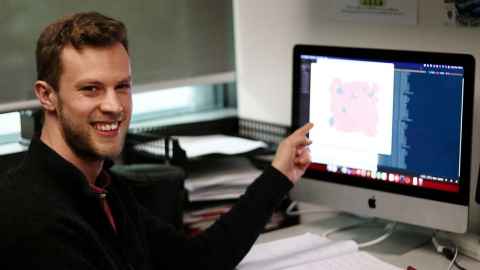Flicking the switch to reduce carbon dioxide
3 November 2021
Dr Charlie Ruffman has been awarded a Rutherford Foundation Postdoctoral Fellowship for research entitled: ‘Flicking the switch to reduce carbon dioxide by melting metallic alloys?’

Removing carbon dioxide from our atmosphere is a key component of all global strategies to limit climate warming over the coming decades. While capturing carbon dioxide remains the first step, we should also make practical use of it.
Carbon dioxide can be chemically converted into biofuels and industrial raw materials. To efficiently perform these chemical reactions, metal catalysts are required to ensure the desired products are produced, and not unwanted biproducts.
Recent work shows that one such metal catalyst, gallium-tin, shows great promise compared to current catalysts. Interestingly gallium-tin only shows its promising catalytic properties when it is in liquid form.
To unleash the true potential of this promising catalyst, more research into its catalytic mechanisms and chemical properties is essential.
In his Rutherford Foundation Postdoctoral Fellowship, Dr Ruffman will explore the precise reasons why gallium-tin makes such a good catalyst. Using advanced computer simulations, the conversion of gallium-tin from solid to liquid form will be studied. During the conversion process, gallium-tin’s properties will be carefully monitored. How carbon dioxide interacts with gallium-tin at the molecular level will also be simulated and studied.
The results will allow Dr Ruffman to pinpoint why gallium-tin catalysts are so promising.
This research will direct the design of future catalysts, to help unlock a sustainable and carbon-neutral economy in Aotearoa New Zealand and beyond.
Up to now Dr Ruffman has been working on designing and improving catalysts for producing hydrogen fuels which are an environmentally friendly alternative to fossil fuels and which releases only water as a byproduct.
“I’m really excited to be taking on this project. It’s work like that that gives us tools we can use to really start mitigating climate change.”
Media contact
Anne Beston | Media adviser
DDI 09 923 3258
Mob 021 970 089
Email a.beston@auckland.ac.nz